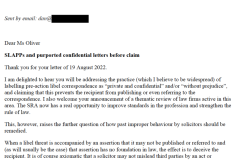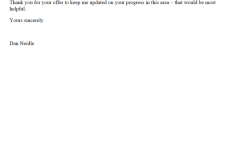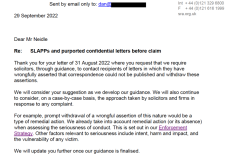The SRA will be cracking down on solicitors who send libel threats that they assert are confidential, and can’t be published – when they’re not and they can. The SRA has now made it clear that these solicitors should give serious consideration to writing to past recipients of these threats, and withdrawing incorrect assertions of confidentiality.
When solicitors send journalists and bloggers letters threatening a libel action, or demanding a retraction, it’s common practice for them to claim that their correspondence is “without prejudice” and/or “confidential”, and can’t be published (or even referred to). It’s a testament to the success of this tactic that I’d no idea this was going on, until I received a letter of exactly this kind.
The small problem is that these letters will almost never be “confidential”, mostly will not be “without prejudice”, and even if they are “without prejudice”, that doesn’t prevent publication. This is not one of those cases where lawyers in good faith can disagree, and the law is complicated and uncertain – it is simply nonsense.1I am a tax lawyer, and not an expert in confidentiality – although like most commercial lawyers I have a reasonable knowledge of the law – but I have spoken to lawyers who have real expertise in the law of confidence/confidentiality More on the reasons for this here.
This isn’t a small thing. The Government rightly says that aggressive dubious libel claims – strategic lawsuits against public participation (SLAPPs) – are a threat to free speech and a free press. But SLAPPs only work in darkness – give them the light of publicity and the strategy falls apart. The people writing these letters know that – that’s why they make the phony assertions of confidentiality. If we can end the phony assertions, the SLAPPers will know that any libel threat risks a Streisand effect that will just give more publicity to whatever accusation they’re trying to censor.
I wrote to the Solicitors’ Regulatory Authority back in July, asking them to end the practice of solicitors making phoney claims of confidentiality in libel letters, and received this excellent response:
As part of our work, we are currently developing further specific guidance to the profession on the topic of SLAPPs, highlighting the issues arising from our casework. Further to your letter, we plan (amongst other things) specifically to address the practice of labelling correspondence as “private and confidential” and / or “without prejudice”, and to address the conditions under which doing so may be a breach of our requirements. We think that this approach will help solicitors to comply with our existing standards and regulations and to use those labels only when appropriate. We can update you as and when we publish this guidance.
We are also to carry out a thematic review of a targeted sample of firms, looking at the steps taken by firms to address the issues raised in our Conduct in Disputes guidance. The outcomes of this review, as well as our enforcement work and the work currently being done by the government on reform of the law relating to SLAPPs, may in due course inform further updates to our guidance.
That begged the question: what happens where a solicitor has previously sent a letter to a journalist, or a small-time blogger, which wrongly claimed to be confidential? Solicitors are required to behave in accordance with the SRA Principles: to act with honesty, integrity, independence, and to uphold the rule of law. That means not making statements which you know are false; but it also means that you have a duty to correct a false statement (even if you didn’t know it was false at the time you made it2And to be fair, I expect most cases will be in this category. Solicitors love their templates, and many core elements of a letter they send today will be based upon something that was first put together many years, or even decades ago. So I expect most solicitors sending out these letters did so in good faith, not appreciating that they were asserting something that was wrong as a matter of law. However now they are alerted to the point, and they are aware (or should be aware) that these assertions are false).
I therefore wrote to the SRA last month, asking them to include in their guidance a requirement for solicitors to proactively correct false claims of confidentiality:
The SRA has now replied, saying that they will consider adding that to their guidance; and, importantly, adding that where a firm has made a false assertion of confidentiality, whether or not they’ve subsequently withdrawn that assertion will be taken into account when and if the SRA comes to consider a complaint against that firm:
When the SRA guidance comes out, if it’s as clear as I expect it to be, that should trigger a wave of SRA complaints by everyone who’s received a letter with a phony confidentiality claim – whether they’re a national newspaper or a blogger with a readership of a dozen.
Those solicitors who’ve sent these letters should be giving serious consideration to proactively writing to past recipients of these letters, and withdrawing their false assertions. They should do this because it’s right. They should also be very concerned about the consequences – for their firms, and for them personally – if they don’t.
Photo by Kristina Flour on Unsplash
-
1I am a tax lawyer, and not an expert in confidentiality – although like most commercial lawyers I have a reasonable knowledge of the law – but I have spoken to lawyers who have real expertise in the law of confidence/confidentiality
-
2And to be fair, I expect most cases will be in this category. Solicitors love their templates, and many core elements of a letter they send today will be based upon something that was first put together many years, or even decades ago. So I expect most solicitors sending out these letters did so in good faith, not appreciating that they were asserting something that was wrong as a matter of law. However now they are alerted to the point, and they are aware (or should be aware) that these assertions are false





2 responses to “Time for solicitors who’ve falsely claimed their libel letters are “confidential” to put things right”
Yes, Gauke was indeed a sad loss to the profession. But this is definitely a temporary diversion. I am here to do tax, and only tax,, and tax is the only area where I have expertise. So I will continue to be mainly about tax, and once the SLAPPing is done, that will return to being my 100% focus.
Interesting. But.
I find the tax analysis and investigation insightful, intelligent and therefore fascinating, but please don’t go the way of another well known tax lawyer and get diverted.